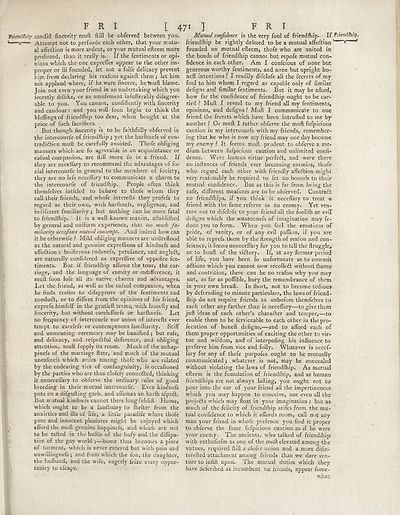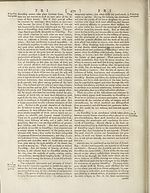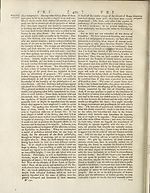Encyclopaedia Britannica > Volume 7, ETM-GOA
(513) Page 471
Download files
Complete book:
Individual page:
Thumbnail gallery: Grid view | List view

F R I [ 47i ] F R I
Friendflup candid finc'erity muft ftill be obferved between you.
L—-v—— Attempt not to perfuade each other, that your mutu¬
al affedion is more ardent, or your mutual efteem more
profound, than it really is. If the fentiments or opi¬
nions which the one expreffes appear to the other im¬
proper or ill founded, let not a falfe delicacy prevent
him from declaring his reafons againft them ; let him
not applaud where, if he were fincere, he tnuft blame.
Join not even your friend in an undertaking which you
iecretly dillike, or an amufement infuflerably difagree-
able to you. You cannot, confidently with fincerity
and candour: and you will foon begin to think the
bleffings of friendfhip too dear, when bought at the
price of fuch facrifices.
But though lincerity is to be faithfully obferved in
the intercourfe of friendfhip ; yet the harfhnefs of con¬
tradiction muit be carefully avoided. Thofe obliging
manners which are fo agreeable in an acquaintance or
cafual companion, are ftill more fo in a friend. If
they are neceffary to recommend the advantages of fo-
cial intercourfe in general to the members of fociety,
they are no lefs neceffary to communicate a charm to
the intercourfe of friendfhip. People often think
themfelves intitled to behave to thofe whom they
call their friends, and whofe interefts they profefs to
regard as their own, with harfhnefs, negligence, and
indifcreet familiarity ; but nothing can be more fatal
to friendfhip. It is a well known rnaxitn, eftablifhed
by general and uniform experience, that too much fa¬
miliarity occafwns mutual contempt. And indeed how can
it be otherwife ? Mild obliging manners are under flood
as the natural and genuine expreffrons of kindnefs and
affe&ion : boifterous rudenefs, petulance, and negleft,
are naturally confidered as expreflive of oppofite fen¬
timents. But if friendfhip affume the tone, the car¬
riage, and the language of enmity or indifference, it
mull foon lofe all its native charms and advantages.
Let the friend, as well as the cafual companion, when
he finds reafon to difapprove of the fentiments and
conduct, or to diffent from the opinions of his friend,
exprefs himfelf in the gentleft terms, with honefly and
fincerity, but without careleffnefs or harfhnefs. Let
no frequency of intercourfe nor union of interefts ever
tempt to carelefs or contemptuous familiarity. Stiff
and unmeaning ceremony may be banifhed; but eafe,
and delicacy, and refpedtful deference, and obliging
attention, muft fupply its room. Much of the unhap-
pinefs of the marriage ftate, and much of the mutual
uneafinefs which arifes among thofe who are related
by the endearing ties of confanguinity, is occafioned
by the parties who are thus clofely connedted, thinking
it unneceffary to obferve the ordinary rules of good
breeding in their mutual intercourfe. Even kindnefs
puts on a difgufting garb, and aflumes an harfh afpedl.
But mutual kindnefs cannot there longfubfift. Home,
which ought to be a fandluary to fhelter from the
anxieties and ills of life, a little paradife where thofe
pure and innocent pleafures might be enjoyed which
afford the moft genuine happinefs, and which are not
to be tafled in the buftle of the bufy and the diflipa-
tion of the gay world 5—home thus becomes a place
of torment, which is never entered but with pain and
unwillingnefs; and from which the fon, the daughter,
the hufband, and the wife, eagerly feize every oopor-
'j tunity to efcape.
Mutual confidence is the very foul of friendfhip.. If
friendfhip be rightly defined to be a mutual affedlion
founded on mutual efteem, thofe who are united in
the bonds of friendfhip cannot but repofe mutual con¬
fidence in each other. Am I confcious of none but
generous worthy fentiments, and none but upright ho-
neft intentions ? I readily difclofe all the fecrets of my
foul to him whom I regard as capable only of fimilar
defigns and fimilar fentiments. But it may be afked,
how far the confidence of friendfhip ought to be car¬
ried ? Muft I reveal to my friend all my fentiments,
opinions, and defigns ? Muft I communicate to one
friend the fecrets which have been intruded to me by
another ? Or muft I rather obferve the moft fufpicious
caution in my intercourfe with my friends, remember¬
ing that he who is now my friend may one day become
my enemy ? It feems moft prudent to obferve a me¬
dium between fufpicious caution and unlimited confi¬
dence. Were human virtue perfeft, and were there
no inftances of friends ever becoming enemies, thofe
who regard each other with friendly affedlion might
very reafonably be required to fet no bounds to their
mutual confidence. But as this is far from being the
cafe, different meafures are to be obferved. Contrail
no friendfhips, if you think it neceffary to treat a
friend with the fame referve as an enemy. Yet ven¬
ture not to difclofe to your friend all the foolifh or evil
defigns which the wantonnefs of imagination may fe-
duce you to form. When you feel the emotions of
pride, of vanity, or of any evil paffion, if you are
able to reprefs them by the ftrength of reafon and con-
fcience, it feems unneceffary for you to tell the ftruggle,
or to boaft of the vi&ory. If, at any former period
of life, you have been fo unfortunate as to commit
a&ions which you cannot now recoiled! without ftramc
and contrition, there can be no reafon why you may
not, as far as poffible, bury the remembrance of them
in your own breaft. In Ihort, not to become tedious
by defeending to minute particulars, the laws of friend-
ftrip do not require friends to unbofom themfelves to
each other any farther than is necelfary—to give them
juft ideas of each other’s charadler and temper,—to
enable them to be ferviceable to each other in the pro-
fecution of honeft defigns,—and to afford each of
them proper opportunities of exciting the other to vir¬
tue and wifdom, and of interpofing his influence to
preferve him from vice and folly. Whatever is necef¬
fary for any of thefe purpofes ought to be mutually
communicated; whatever is not, may be concealed
without violating the laws of friendftrip. As mutual
efteem is the foundation of friendflrip, and as human
friendfliips are not always lafting, you ought not to
pour into the ear of your friend all the impertinences
which you may happen to conceive, nor even all the
projedls which may float in your imagination : but as
much of the felicity of friendfhip arifes from the mu¬
tual confidence to which it affords room, call not any
man your friend in whofe prefence you find it proper
to obferve the fame fufpicious caution as if he were
your enemy. The ancients, who talked of friendihip
with enthufiafm as one of the moft elevated among the
virtues, required ftill a clofer union and a more dilin-
terefled attachment among friends than we dare ven¬
ture to infill upon. The mutual duties which they
have deferibed as incumbent On friends, appear fome-
whafc
Friendflup candid finc'erity muft ftill be obferved between you.
L—-v—— Attempt not to perfuade each other, that your mutu¬
al affedion is more ardent, or your mutual efteem more
profound, than it really is. If the fentiments or opi¬
nions which the one expreffes appear to the other im¬
proper or ill founded, let not a falfe delicacy prevent
him from declaring his reafons againft them ; let him
not applaud where, if he were fincere, he tnuft blame.
Join not even your friend in an undertaking which you
iecretly dillike, or an amufement infuflerably difagree-
able to you. You cannot, confidently with fincerity
and candour: and you will foon begin to think the
bleffings of friendfhip too dear, when bought at the
price of fuch facrifices.
But though lincerity is to be faithfully obferved in
the intercourfe of friendfhip ; yet the harfhnefs of con¬
tradiction muit be carefully avoided. Thofe obliging
manners which are fo agreeable in an acquaintance or
cafual companion, are ftill more fo in a friend. If
they are neceffary to recommend the advantages of fo-
cial intercourfe in general to the members of fociety,
they are no lefs neceffary to communicate a charm to
the intercourfe of friendfhip. People often think
themfelves intitled to behave to thofe whom they
call their friends, and whofe interefts they profefs to
regard as their own, with harfhnefs, negligence, and
indifcreet familiarity ; but nothing can be more fatal
to friendfhip. It is a well known rnaxitn, eftablifhed
by general and uniform experience, that too much fa¬
miliarity occafwns mutual contempt. And indeed how can
it be otherwife ? Mild obliging manners are under flood
as the natural and genuine expreffrons of kindnefs and
affe&ion : boifterous rudenefs, petulance, and negleft,
are naturally confidered as expreflive of oppofite fen¬
timents. But if friendfhip affume the tone, the car¬
riage, and the language of enmity or indifference, it
mull foon lofe all its native charms and advantages.
Let the friend, as well as the cafual companion, when
he finds reafon to difapprove of the fentiments and
conduct, or to diffent from the opinions of his friend,
exprefs himfelf in the gentleft terms, with honefly and
fincerity, but without careleffnefs or harfhnefs. Let
no frequency of intercourfe nor union of interefts ever
tempt to carelefs or contemptuous familiarity. Stiff
and unmeaning ceremony may be banifhed; but eafe,
and delicacy, and refpedtful deference, and obliging
attention, muft fupply its room. Much of the unhap-
pinefs of the marriage ftate, and much of the mutual
uneafinefs which arifes among thofe who are related
by the endearing ties of confanguinity, is occafioned
by the parties who are thus clofely connedted, thinking
it unneceffary to obferve the ordinary rules of good
breeding in their mutual intercourfe. Even kindnefs
puts on a difgufting garb, and aflumes an harfh afpedl.
But mutual kindnefs cannot there longfubfift. Home,
which ought to be a fandluary to fhelter from the
anxieties and ills of life, a little paradife where thofe
pure and innocent pleafures might be enjoyed which
afford the moft genuine happinefs, and which are not
to be tafled in the buftle of the bufy and the diflipa-
tion of the gay world 5—home thus becomes a place
of torment, which is never entered but with pain and
unwillingnefs; and from which the fon, the daughter,
the hufband, and the wife, eagerly feize every oopor-
'j tunity to efcape.
Mutual confidence is the very foul of friendfhip.. If
friendfhip be rightly defined to be a mutual affedlion
founded on mutual efteem, thofe who are united in
the bonds of friendfhip cannot but repofe mutual con¬
fidence in each other. Am I confcious of none but
generous worthy fentiments, and none but upright ho-
neft intentions ? I readily difclofe all the fecrets of my
foul to him whom I regard as capable only of fimilar
defigns and fimilar fentiments. But it may be afked,
how far the confidence of friendfhip ought to be car¬
ried ? Muft I reveal to my friend all my fentiments,
opinions, and defigns ? Muft I communicate to one
friend the fecrets which have been intruded to me by
another ? Or muft I rather obferve the moft fufpicious
caution in my intercourfe with my friends, remember¬
ing that he who is now my friend may one day become
my enemy ? It feems moft prudent to obferve a me¬
dium between fufpicious caution and unlimited confi¬
dence. Were human virtue perfeft, and were there
no inftances of friends ever becoming enemies, thofe
who regard each other with friendly affedlion might
very reafonably be required to fet no bounds to their
mutual confidence. But as this is far from being the
cafe, different meafures are to be obferved. Contrail
no friendfhips, if you think it neceffary to treat a
friend with the fame referve as an enemy. Yet ven¬
ture not to difclofe to your friend all the foolifh or evil
defigns which the wantonnefs of imagination may fe-
duce you to form. When you feel the emotions of
pride, of vanity, or of any evil paffion, if you are
able to reprefs them by the ftrength of reafon and con-
fcience, it feems unneceffary for you to tell the ftruggle,
or to boaft of the vi&ory. If, at any former period
of life, you have been fo unfortunate as to commit
a&ions which you cannot now recoiled! without ftramc
and contrition, there can be no reafon why you may
not, as far as poffible, bury the remembrance of them
in your own breaft. In Ihort, not to become tedious
by defeending to minute particulars, the laws of friend-
ftrip do not require friends to unbofom themfelves to
each other any farther than is necelfary—to give them
juft ideas of each other’s charadler and temper,—to
enable them to be ferviceable to each other in the pro-
fecution of honeft defigns,—and to afford each of
them proper opportunities of exciting the other to vir¬
tue and wifdom, and of interpofing his influence to
preferve him from vice and folly. Whatever is necef¬
fary for any of thefe purpofes ought to be mutually
communicated; whatever is not, may be concealed
without violating the laws of friendftrip. As mutual
efteem is the foundation of friendflrip, and as human
friendfliips are not always lafting, you ought not to
pour into the ear of your friend all the impertinences
which you may happen to conceive, nor even all the
projedls which may float in your imagination : but as
much of the felicity of friendfhip arifes from the mu¬
tual confidence to which it affords room, call not any
man your friend in whofe prefence you find it proper
to obferve the fame fufpicious caution as if he were
your enemy. The ancients, who talked of friendihip
with enthufiafm as one of the moft elevated among the
virtues, required ftill a clofer union and a more dilin-
terefled attachment among friends than we dare ven¬
ture to infill upon. The mutual duties which they
have deferibed as incumbent On friends, appear fome-
whafc
Set display mode to:
![]() Universal Viewer |
Universal Viewer | ![]() Mirador |
Large image | Transcription
Mirador |
Large image | Transcription
Images and transcriptions on this page, including medium image downloads, may be used under the Creative Commons Attribution 4.0 International Licence unless otherwise stated. ![]()
| Encyclopaedia Britannica > Encyclopaedia Britannica > Volume 7, ETM-GOA > (513) Page 471 |
|---|
| Permanent URL | https://digital.nls.uk/189127898 |
|---|
| Attribution and copyright: |
|
|---|
| Description | Ten editions of 'Encyclopaedia Britannica', issued from 1768-1903, in 231 volumes. Originally issued in 100 weekly parts (3 volumes) between 1768 and 1771 by publishers: Colin Macfarquhar and Andrew Bell (Edinburgh); editor: William Smellie: engraver: Andrew Bell. Expanded editions in the 19th century featured more volumes and contributions from leading experts in their fields. Managed and published in Edinburgh up to the 9th edition (25 volumes, from 1875-1889); the 10th edition (1902-1903) re-issued the 9th edition, with 11 supplementary volumes. |
|---|---|
| Additional NLS resources: |
|

